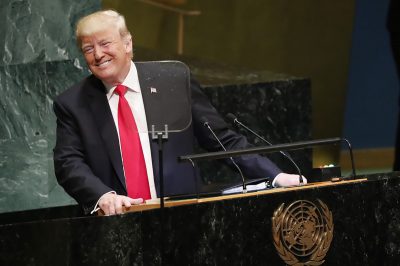Fifteen Lies Per Day in 2018: Trump Put ‘Unprecedented Deception” into Overdrive

Finding that President Donald Trump became “increasingly unmoored from the truth in 2018,” the Washington Post reports that the president told lies to the American public at about three times the rate he did the previous year—when voters and the media were already expressing shock at the repeated false statements coming from the White House.
According to Glenn Kessler, author of the Post‘s Fact Checker column, during his “year of unprecedented deception,” Trump told an average of 15 lies per day in 2018, bringing the total number of documented lies since he took office in January 2017 to 7,645.
At the beginning of 2018, according to the paper’s tally, the president had told about 2,000 lies while in office.
“Trump began 2018 on a similar pace as last year,” reported Kessler. “Through May, he generally averaged about 200 to 250 false claims a month. But his rate suddenly exploded in June, when he topped 500 falsehoods, as he appeared to shift to campaign mode. He uttered almost 500 more in both July and August, almost 600 in September, more than 1,200 in October and almost 900 in November. In December, Trump drifted back to the mid-200s.”
The president’s rate of lying exploded around the time that his administration’s family separation policy provoked international outrage. The president made two of his biggest false claims of the year at that time, saying that the White House had not adopted a policy of separating families who cross the U.S.-Mexico border but was simply following existing laws passed by Congress.
“The American public deserves to know what our government has been thinking in terms of how to carry out these extremely devastating policies,” Emily Creighton of the American Immigration Council told The Intercept in September, after a Department of Homeland Security memo confirmed that the practice was indeed proposed and approved by the Trump administration.
Along with lies that affected the lives of thousands of families who were seeking asylum, Trump denied that he had imposed a significant number of tariffs, when he had actually introduced $305 billion in tariffs on numerous imports; fabricated a claim by the Palm Beach Post that he was to blame for traffic jams; lied about the number of attendees at his rallies; repeatedly lied that the suspect in a 2017 attack in New York in which eight pedestrians were killed by a pickup truck had brought two dozen relatives to the U.S. through family-based migration; and told thousands of other falsehoods.
On Twitter, Kessler’s Post colleague, Greg Sargent, wrote that Trump’s repeated lies must be understood as a coordinated disinformation campaign, not simply a collection of lies about various matters.
“Why does Trump lie *all the time* about *everything,* even the most trivial, easily disprovable matters?” Sargent wrote. “The frequency and the audacity of Trump’s disinformation is the *whole point* of it—to wear you down. More and more of the lies slip past, undetected and uncorrected.”
1) As Trump ends the year with a flood of lies about his wall, we need to recapture a core truth about this presidency.
Trump isn't “twisting the truth” or “stubbornly refusing to admit error.”
Trump is engaged in *disinformation.*
This is a different thing entirely.
*THREAD*
— Greg Sargent (@ThePlumLineGS) December 30, 2018
6) Once Trump’s lying is understood as concerted and deliberate disinformation, it becomes clear that the frequency and audacity of it is *the whole point.*
Those are features of the lying. They are central to declaring the power to say what reality is:https://t.co/6sh4mn4uBT pic.twitter.com/ueRKHwVGhP
— Greg Sargent (@ThePlumLineGS) December 30, 2018
*
This work is licensed under a Creative Commons Attribution-Share Alike 3.0 License
Note to readers: please click the share buttons above. Forward this article to your email lists. Crosspost on your blog site, internet forums. etc.

